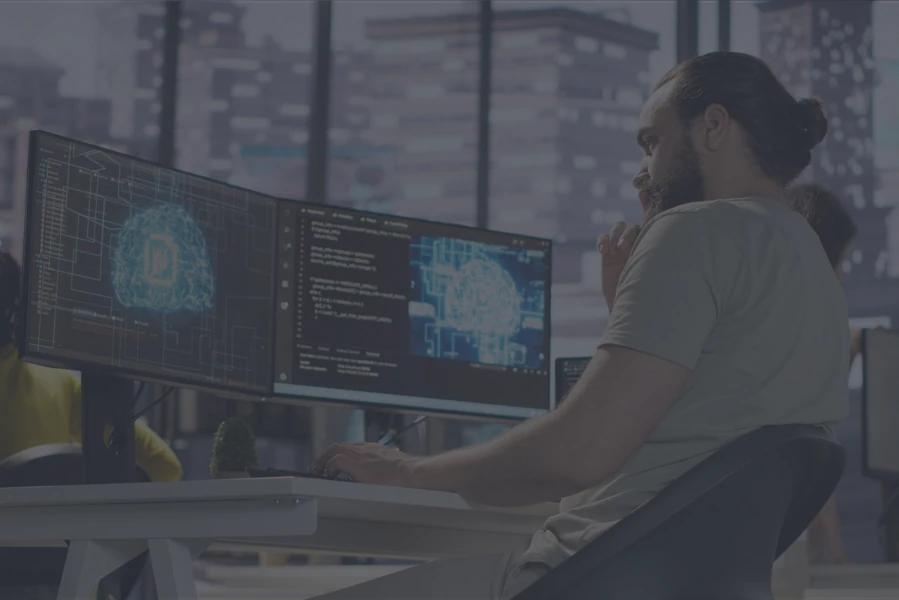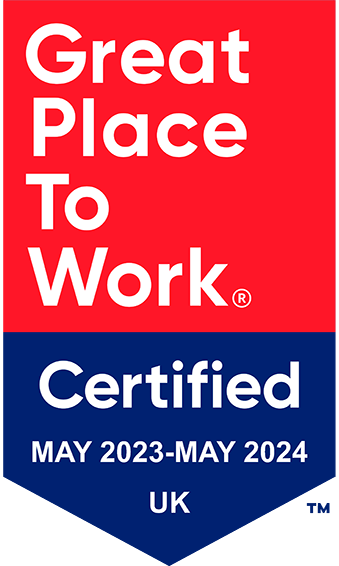The demand for exceptional talent has never been more critical. Recruitment practices are undergoing a revolutionary transformation, thanks to the integration of Artificial Intelligence (AI). AI-powered recruitment is reshaping the hiring process, offering unprecedented efficiency, accuracy, and strategic capability.
Artificial Intelligence (AI) has emerged as a transformational force, infusing the recruitment process with intelligent automation, data-driven insights, and new approaches to talent acquisition. In this article, we delve into the impact of AI on recruitment, from redefining candidate sourcing to mitigating bias in talent selection. AI’s influence extends across the entire recruitment spectrum, ushering in a new era of strategic hiring practices.
What is AI for recruitment?
AI for recruitment involves using artificial intelligence technologies during stages of the hiring process. From sourcing and screening candidates to assessing their skills and predicting performance, AI plays a pivotal role in streamlining, automating, and improving recruitment workflows.
Unlike traditional recruitment methods heavily reliant on manual intervention, AI for recruitment now includes advanced tools like generative AI, large language models (LLMs), and predictive analytics. These allow for:
- Writing inclusive, effective job descriptions
- Screening resumes and applications at scale using natural language processing (NLP)
- Personalised candidate engagement via AI-generated communication
- Predicting long-term performance and retention based on data patterns
Rather than replacing human expertise, AI is a complementary tool that empowers recruiters to focus on high-value, relationship-driven tasks.
Examples of AI in recruitment
AI is now embedded into nearly every stage of the recruitment lifecycle.
CV/Resume screening
AI-powered platforms such as Eightfold and SeekOut can analyse and rank resumes at scale using NLP, identifying candidates that align with specific job criteria, often catching highly relevant applicants that manual screening might miss.
Chatbots for initial interaction
AI chatbots handle initial candidate queries, collect information, schedule interviews, and even conduct pre-screening conversations. This reduces response time and increases candidate engagement.
Candidate sourcing
Machine learning algorithms identify and recommend candidates from job boards, professional networks, and internal databases, often surfacing passive candidates not actively applying.
Predictive analytics for candidate fit
Using historical performance data and advanced models, AI systems can predict how well a candidate will perform or fit culturally within a team.
Video interview analysis
Platforms like HireVue use AI to evaluate verbal and non-verbal cues during video interviews, helping to assess soft skills, emotional intelligence, and communication style.
Skills assessment
Adaptive AI tools test both technical and soft skills in real time, adjusting difficulty based on candidate responses to ensure accurate measurement.
Automated interview scheduling
AI scheduling assistants analyse calendars and availability to arrange interviews, saving time and reducing admin workload automatically.
Diversity and inclusion monitoring
AI can analyse job postings and selection outcomes to detect bias and suggest more inclusive practices. It also helps remove biased language from job ads.
Employee retention prediction
Predictive analytics are used to gauge which candidates are most likely to stay with a company long-term based on behavioural patterns and engagement data.
Onboarding assistance
AI-driven onboarding tools offer tailored guides, answer FAQs, and help new hires navigate their first weeks more smoothly.
The rise of generative AI in recruitment
Generative AI tools like ChatGPT, Claude, and Gemini have become standard in the hiring toolkit. Recruiters are using generative AI to:
- Draft personalised outreach messages
- Create compelling, bias-free job descriptions
- Generate candidate feedback and evaluation summaries
- Provide AI-driven coaching and preparation for candidates
- Develop onboarding materials and learning paths for new hires
Generative AI is also helping with employer branding by crafting content for social media, careers pages, and internal communications, at scale.
How AI is impacting the recruitment process
AI has brought about significant improvements in recruitment processes, leading to faster and more accurate candidate selection. Automated screening tools analyse resumes and identify suitable candidates based on predefined criteria, reducing the time and effort traditionally spent on manual resume reviews. This not only accelerates the recruitment timeline but also allows recruiters to focus on more strategic aspects of the hiring process.
As of 2025, over 70% of companies use AI in some form during recruitment, and 65% Chief Human Resource Officers expect AI to have a positive impact on the HR function over the next two years.
What are the problems with AI in recruitment?
Despite its benefits, AI is not without its risks. A study by Humanities & Social Sciences Communications found that AI algorithms used in recruitment can perpetuate gender, race, colour and personality biases present in historical data. Historical hiring patterns may lead algorithms to favour certain demographics, educational backgrounds, or personality types. However, newer AI systems now include fairness auditing and de-biasing processes to reduce this risk.
Over-reliance on automation may reduce human empathy and intuition in the hiring process. Exceptional qualities in candidates( like resilience or creativity) may be missed if they are not quantifiable. Recruiters must continue to bring emotional intelligence and human judgement to the process.
AI systems also handle vast amounts of personal data, raising concerns around privacy and compliance. In 2025, regulations like the EU AI Act and UK ICO guidelines requires recruiters to provide transparency, maintain consent, and protect sensitive data.
Some AI models are opaque, making it difficult to understand how decisions are made. This lack of explainability can lead to trust issues. To mitigate this, many platforms are shifting toward “explainable AI,” offering insights into how recommendations are generated.
The problem with bias in AI and recruitment
One of the critical challenges associated with AI in recruitment is the potential for bias. Biased algorithms can perpetuate inequalities and hinder diversity efforts within organisations. A study by Harvard Business Review found that AI tools tend to favour candidates from higher socioeconomic backgrounds and disadvantage those from underrepresented groups.
To reduce this risk, organisations must:
- Use diverse and representative training datasets
- Regularly audit AI systems for fairness
- Maintain human oversight throughout the hiring process
Additionally, candidates should be made aware of when and how AI is used in the recruitment journey.
Can AI reduce bias in talent selection?
While AI has the potential to mitigate bias, it requires careful design and continuous monitoring. When designed ethically, AI can help reduce bias by removing gendered or racial language from job descriptions, standardising candidate scoring based on skills rather than background and providing objective data for shortlisting.
Implementing diverse and representative datasets, fine-tuning algorithms to avoid discriminatory patterns, and employing transparency in AI decision-making are crucial steps toward reducing bias.
How will AI affect the staffing industry?
The staffing industry is experiencing a profound impact from AI adoption. Staffing Industry Analysts report that AI adoption among HR professionals has risen to 72%, reflecting increased comfort with AI-driven hiring recommendations. AI streamlines candidate matching, enhances client relationships, and allows staffing agencies to provide more value to both clients and candidates.
AI’s predictive analytics will revolutionise candidate matching by analysing vast datasets to identify patterns correlating to successful hires. This will enable staffing agencies to present clients with candidates who not only possess the required skills but also align with the organisation’s culture and long-term objectives. Enhanced candidate matching can lead to quicker placements, higher client satisfaction, and increased success in meeting clients’ specific workforce needs.
AI is revolutionising recruitment in the cyber security and information security sectors, offering unparalleled efficiency and accuracy. By understanding and addressing the challenges associated with AI in recruitment, organisations and staffing agencies can harness the full potential of this transformative technology, paving the way for a more diverse, efficient, and successful hiring process.
A boutique head hunting and talent solution firm with Cyber and Information Security expertise, Intaso has extensive first-hand expertise across all elements of attracting the right talent from often unfound and untapped resources. We believe that having a genuine passion for the industry, pride in the quality of our services, a tailored range of talent solutions, and a personal approach means we have a unique offering which has worked with businesses of all sizes and industries.
If you are looking for the best talent in the industry, or want to discover a great new role, please get in touch. We would love to hear from you.








